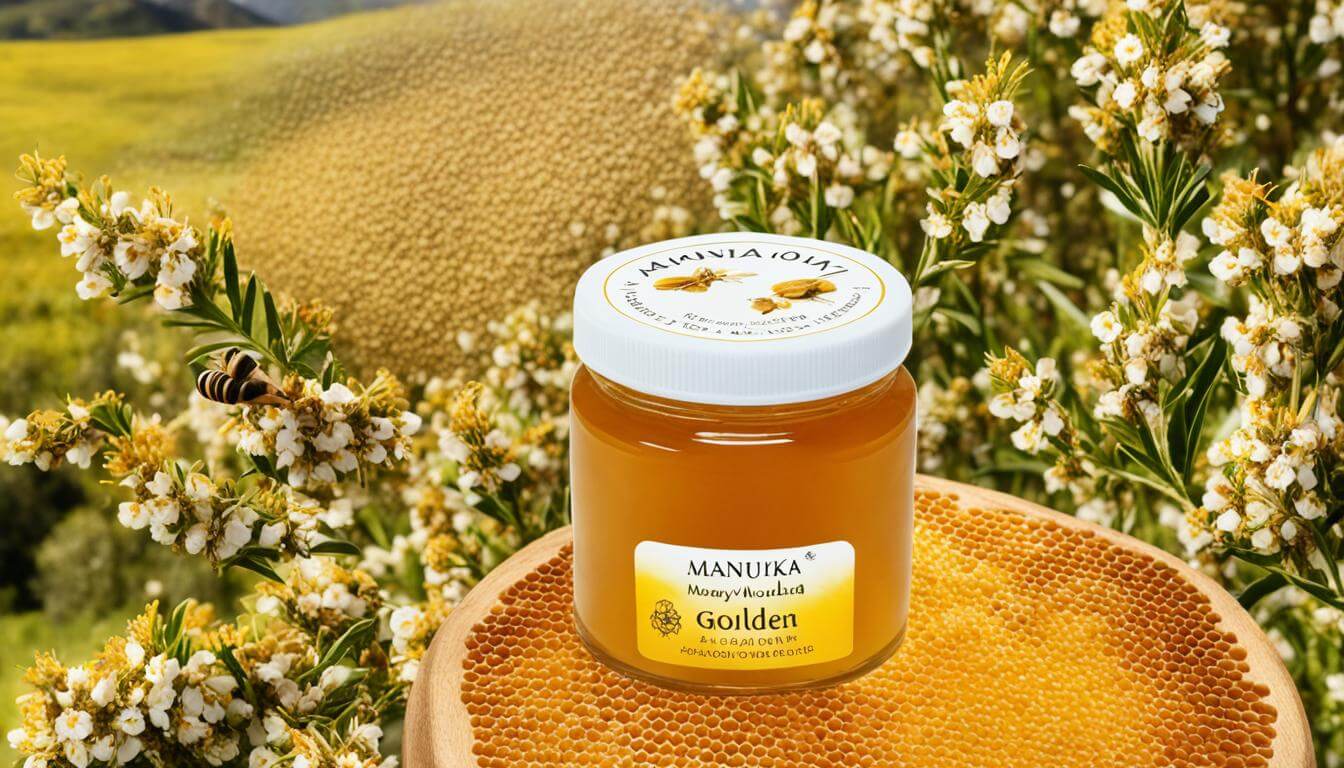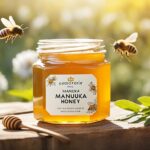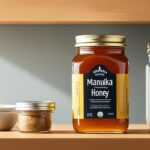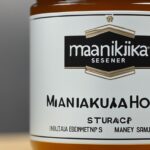Amidst the vast trove of nature’s pharmacopeia, few stand out quite like Manuka honey, whose benefits have sparked a buzz of interest in the holistic healing community. Manuka honey, with its unique natural anti-inflammatory properties, has climbed to the forefront as a potent ally in our quest for wellness.
But what really sets Manuka honey apart in a world teeming with natural remedies? This golden elixir, hailing from New Zealand’s unblemished landscapes, boasts not just sweetness to the palate but a plethora of health advantages. As we delve into the Manuka honey benefits, we uncover how this extraordinary substance is more than a simple sweetener—it becomes a holistic healing partner for those seeking a more natural approach to health and vitality.
Understanding Inflammation and Natural Remedies
Inflammation is a natural process by which our bodies respond to threats such as infections, injuries, and toxins. This immune system response is pivotal in protecting our health, initiating the healing process by bringing more nutrients and immune cells to the site of an issue. However, when inflammation becomes chronic, it can contribute to a host of health problems and becomes one of the key inflammation causes for concern amongst health professionals today.
Chronic inflammation is implicated in diseases such as arthritis, heart disease, diabetes, and even cancer. This underscores the importance of effective anti-inflammatory treatments and maintaining natural health through lifestyle and dietary choices. Natural health solutions offer a holistic approach to managing inflammation without the side effects often associated with prescription drugs.
To contextualize the role of natural remedies in combating inflammation, consider the following comparison:
| Natural Remedy | Anti-Inflammatory Properties | Common Uses |
|---|---|---|
| Turmeric (Curcumin) | Curcumin, the active compound in turmeric, has strong anti-inflammatory and antioxidant effects. | Added to food, taken as a supplement, or applied topically in a paste. |
| Omega-3 Fatty Acids | Found in fish oil and flaxseeds, omega-3s help reduce the production of molecules linked to inflammation. | Consumed through diet or supplements to support heart and joint health. |
| Green Tea | Rich in polyphenols, green tea supports the body’s anti-inflammatory response. | Drunk as a beverage or taken in extract form. |
As the search for natural health solutions continues, many have turned to the remarkable properties of Manuka honey. Its unique components that contribute to its anti-inflammatory capacities are worth investigating in greater detail. In the following sections, we’ll explore why Manuka honey is gaining recognition as a powerful agent in the natural health community, building upon our understanding of inflammation and the breadth of remedies available.
What Is Manuka Honey?
At the heart of New Zealand’s vast, serene landscapes thrives the Manuka bush, Leptospermum scoparium, whose flowers are the source of the world-renowned New Zealand Manuka honey. This honey is not just another sweetener; it is a powerful, raw honey with distinct characteristics, thanks to the Unique Manuka Factor (UMF). The UMF is a global standard in identifying and measuring the antibacterial strength of Manuka honey, ensuring consumers receive a product that’s both pure and potent.
But what exactly sets Manuka honey apart? Beyond its UMF rating, this precious substance is admired for numerous raw honey benefits. These benefits include its therapeutic properties, and it’s often used as a natural remedy to support wound healing, soothe a sore throat, enhance digestion, and bolster the immune system. The purity of Manuka honey is paramount, and the UMF trademark guarantees that what’s in the jar is genuine, traceable to a single New Zealand source, and has been independently verified for quality and purity.
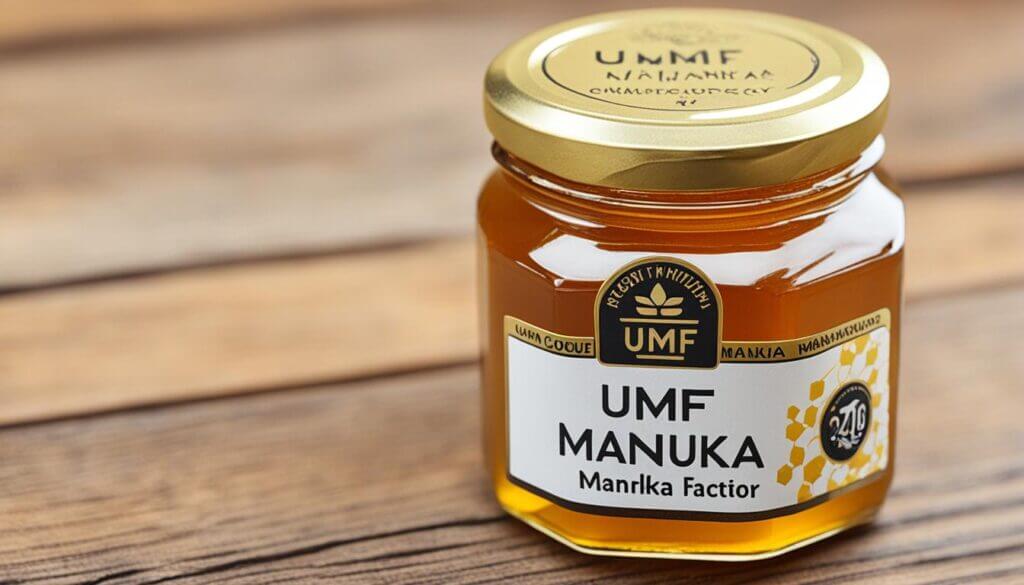
The UMF grading system is a comprehensive measure that assesses key indicators such as Leptospirin, Methylglyoxal, and Dihydroxyacetone. To carry the UMF trademark, the honey must be produced, packed, and labeled in New Zealand, maintaining the connection between the product and its origin. As a premium product, Manuka honey commands a higher price due to its unique qualities, the rigorous standards it must meet, and its status as a valued addition to health and wellness routines.
- Independently Verified: Ensures that the honey meets the high standards set by the UMF Honey Association of New Zealand.
- Pure and Natural: It’s a product that comes straight from the bees to you, without any additives or processing diminishing its natural benefits.
- Health Support: Its unique properties have been shown to provide a range of health benefits, from antibacterial applications to supporting overall well-being.
As consumers worldwide continue to prioritize health and natural products, unique identifiers like the UMF ensure confidence in purchasing authentic, healing New Zealand Manuka honey. When seeking the therapeutic benefits that Manuka honey provides, always look for the UMF mark—a guarantee of purity, potency, and origin.
Historical Use of Honey in Medicine
Exploring the annals of history reveals that honey’s reputation as a healer is not merely a contemporary phenomenon but can be traced back to the cradle of civilization. Traditional medicine has harnessed honey for its potent healing properties. Ancient remedies often incorporated honey as a key component in the treatment and management of various ailments. From the Egyptian’s papyrus scrolls to Chinese manuscripts, the wisdom of using honey in medicine spanned across continents.
In the realm of ancient remedies, honey was more than just a sweetener; it was a panacea. Civilizations around the globe, like the Greeks and Romans, also revered honey for its antiseptic properties, while indigenous cultures used it in a multitude of medicinal concoctions. Today, modern science has begun to unravel the mysteries of honey’s remarkable healing attributes, looking at its effectiveness in wound healing, as an antibiotic, and its utility in modern cough syrups and lozenges.
| Civilization | Usage | Application |
|---|---|---|
| Egyptians | Wound healing | Applied topically on wounds and cuts |
| Greeks | Disease prevention | Ingested to defend against diseases |
| Chinese | Gastrointestinal aid | Used in herbal preparations for digestion |
| Ayurveda | Immunity booster | Mixed with herbs to fortify the immune system |
As traditional medicine continues to inspire contemporary healing practices, the remarkable stories of ancient remedies often include honey as a critical element. These ancient practices not only lend credibility to its healing properties but also inspire a newfound respect for this natural commodity. In essence, honey has not only sweetened the palates through the ages but also soothed the ailments of countless generations.
While the ancients may not have understood the scientific nuances of honey healing properties, there was an intrinsic awareness of its benefits to human health. The lineage of honey as a medicinal aid continues to this day, as researchers further explore its application in modern medicine, paying tribute to the wisdom of our ancestors while carving a path for future discoveries.
The Science Behind Manuka Honey Anti-Inflammatory Effects
Recent scientific research has delved into the remarkable anti-inflammatory effects of Manuka honey, highlighting the presence of bioactive compounds. Chief among these is methylglyoxal, a compound with powerful anti-inflammatory properties. Scientists have found that the phenolic content in Manuka honey is also exceptionally high, contributing to its potent effects. These compounds interact synergistically to reduce inflammation and promote healing.
A critical look at these components showcases Manuka honey as more than a sweetener—it’s a powerhouse of beneficial substances. Understanding the roles of these key bioactive compounds can help us appreciate why Manuka honey has earned such acclaim in natural health circles.
- Methylglyoxal (MGO): Identified as the defining component of Manuka honey, methylglyoxal has been extensively studied for its effectiveness in suppressing inflammatory responses.
- Phenolic Compounds: They offer antioxidant benefits that are essential in protecting the body’s cells from oxidative stress, which often exacerbates inflammation.
- Hydrogen Peroxide: While less unique to Manuka, hydrogen peroxide found in various honeys provides antiseptic qualities that aid in the body’s defense mechanisms.
- Dihydroxyacetone: Found in the nectar of Manuka flowers, this compound is converted into methylglyoxal during the honey production process inside the beehive.
These studies present compelling evidence supporting the adoption of Manuka honey into health regimes, particularly for those aiming to manage inflammation naturally. Moreover, the synergy between Manuka honey’s various components may contribute to its higher efficacy compared to other honeys.
Manuka Honey Compared to Other Varieties
When exploring the world of honey varieties, Manuka honey often shines as a beacon for its unparalleled antibacterial properties and potent health-boosting capabilities. A deeper look into the unique qualities of Manuka honey compared to other types will illuminate why this honey variety is held in high esteem among natural remedy enthusiasts.
| Honey Variety | Antibacterial Strength | Source | Notable Health Benefits |
|---|---|---|---|
| Manuka Honey | High (Methylglyoxal MGO) | New Zealand Manuka Bush | Supports digestive health, soothes sore throats, aids wound healing |
| Clover Honey | Moderate | Canada, New Zealand | Commonly used sweetener, good for everyday use |
| Acacia Honey | Low | Europe, North America | Supports blood sugar control, promotes skin health |
| Buckwheat Honey | Higher than average | USA, Canada | Rich in antioxidants, beneficial for throat and cough remedy |
| Eucalyptus Honey | Moderate | Australia, Brazil | Immune system booster, may alleviate cold symptoms |
The table above showcases that while all honey varieties carry inherent antibacterial qualities, Manuka honey stands distinguished, largely due to its high MGO (Methylglyoxal) content, which grants it powerful antibacterial potency. Originating from the uncultivated Manuka bush in New Zealand, Manuka honey not only offers antibacterial benefits but also serves as a multifaceted health-boosting honey. The rigorous testing and certification process it undergoes ensure that consumers receive a product of the highest quality and efficacy.
- MGO Certification: Manuka honey’s antibacterial potency is measured by its MGO content. The higher the MGO rating, the stronger the antibacterial effect.
- UMF Rating: The Unique Manuka Factor (UMF) is a global standard in identifying and measuring the antibacterial strength of Manuka honey.
- Comprehensive Benefits: Manuka honey is celebrated not just for its taste but also for its therapeutic uses, including gastrointestinal treatment, skincare, and wound-care capabilities.
In a world brimming with diverse honey varieties, Manuka honey’s proven efficacy in supporting health and combating bacteria positions it as an exceptional choice for those seeking natural, effective remedies.
Topical vs. Ingested: Ways to Use Manuka Honey
The multifaceted nature of Manuka honey makes it a versatile addition to both your medicine cabinet and your pantry. From soothing sore throats to enhancing wound healing, the applications of Manuka honey straddle the realms of edible remedies and healing topical solutions. Let’s delve into the methods of using Manuka honey for both topical and internal ailments, emphasizing its efficacy and ease of incorporation into daily routines.
Engaging with Manuka honey applications can differ widely, depending on the condition you aim to address. The healing topical honey is a powerhouse for skin conditions, supporting wound care with its antibacterial properties. When ingested, Manuka honey brings a cocktail of health benefits, promoting gastrointestinal wellness and acting as an antioxidant. Below we explore some practical ways to harness the benefits of Manuka honey.
- Topical Application for Wound Care: Apply a thin layer of Manuka honey directly on minor cuts, burns, or ulcers to promote a moist wound environment conducive to healing.
- Skincare Regimen: Incorporate Manuka honey into your beauty routine as a face mask to harness its natural hydrating and antimicrobial properties.
- Dietary Supplementation: Consume Manuka honey by adding a spoonful to your tea or smoothie as a nutritional booster and immune enhancer.
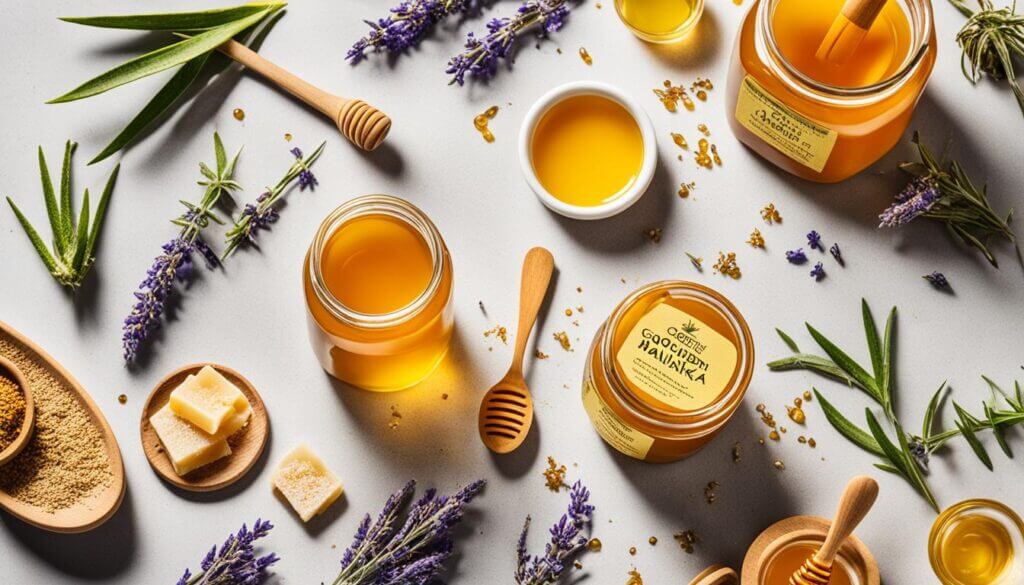
Below is a table highlighting the common uses of Manuka honey and its benefits in topical and ingested form. Each method of application caters to particular needs and optimizes Manuka honey’s natural healing properties for various health benefits.
| Method of Use | Topical | Ingested |
|---|---|---|
| Primary Benefits | Antibacterial, supports natural wound healing | Improves digestion, soothes sore throats |
| Common Applications | Wound dressings, acne spot treatment, eczema relief | Daily consumption for immunity, ingredient in healthy recipes |
| Expert Recommendations | Test on a small skin area first, use sterile medical-grade products for deep wounds | Consult with a healthcare provider if you have diabetes or susceptibility to allergens |
Exploring the utility of Manuka honey as one of the edible remedies and topical agents in your repertoire will unveil a world of natural healing. With responsible and informed usage, this luxurious yet humble substance can enhance your wellness journey.
Manuka Honey in Dermatology
Advancements in dermatology consistently embrace natural remedies to aid in skin health, notably the utilization of Manuka honey for acne treatment and eczema relief. With its potent anti-inflammatory properties, Manuka honey has emerged as a complementary therapy in skin care regimens. Recognizing the therapeutic potential of this natural elixir, dermatologists are increasingly recommending Manuka honey for its healing compounds that not only soothe inflammation but also promote skin repair.
Research indicates that the application of Manuka honey can lead to significant improvements in acne conditions. This is attributed to its antimicrobial properties that combat acne-causing bacteria, and its ability to maintain a moist healing environment. Manuka honey’s hygroscopic nature further assists in keeping the skin hydrated, hence fostering a healthier skin barrier function—vital for those battling eczema.
- Antibacterial activity reduces acne breakouts
- Anti-inflammatory effects decrease redness and irritation
- Humectant properties aid in skin hydration
Below is a table presenting findings from various studies on the effectiveness of Manuka honey in treating dermatological conditions such as acne and eczema:
| Condition | Treatment Duration | Effectiveness |
|---|---|---|
| Acne Vulgaris | 12 Weeks | Significant reduction in acne lesions |
| Eczema (Atopic Dermatitis) | 4 Weeks | Improved skin barrier function and hydration |
It’s important to note that while Manuka honey offers promising eczema relief and acne solutions, skin health outcomes differ from person to person. A holistic approach combining a balanced diet, adequate hydration, and medical consultation enhances the efficacy of Manuka honey in dermatological applications.
Integrating Manuka Honey into Your Diet
For those seeking to enhance their daily health routine, the incorporation of Manuka honey is a delectable and healthy diet addition that offers not just sweetness but also a myriad of well-being benefits. As nature’s nectar, Manuka honey is not only a powerhouse of antioxidants but also a versatile ingredient for numerous recipes. This golden elixir can be seamlessly introduced into regular consumption, contributing to overall health in an appetizing manner.
When integrating Manuka honey into your diet, it is pivotal to consider the quality of the honey. Opt for brands with certified UMF (Unique Manuka Factor) ratings, as this ensures the honey’s potency and purity. A small daily intake—about one to two tablespoons—can be a beneficial additive to your morning tea, yogurt, or smoothie. It’s a simple yet impactful step toward bolstering your immune system and maintaining a balanced lifestyle.

Here are a few delightful Manuka honey recipes to weave this natural sweetener into your meals:
- Manuka Honey Glazed Salmon: Brush a mixture of Manuka honey, soy sauce, and freshly grated ginger over salmon fillets before baking for an infusion of sweet and savory flavors.
- Almond Butter and Manuka Honey Spread: Combine almond butter with a spoonful of Manuka honey for a healthier spread on toast, or as a dip for crisp apple slices.
- Manuka Honey Drizzle on Oatmeal: Elevate your warm bowl of oats with a drizzle of Manuka honey, a sprinkle of cinnamon, and a handful of berries for a nutritious breakfast.
- Refreshing Manuka Honey Lemonade: Stir Manuka honey into freshly squeezed lemon juice and chilled water for an immune-boosting, hydrating drink.
Adapting these Manuka honey recipes into your daily health routine not only adds flavor to your dishes but also imparts the soothing and antibacterial properties of this superfood. Whether used in sweet or savory dishes, Manuka honey is a multifaceted ingredient tailor-made for health-conscious individuals. Remember to start with small amounts and notice how your body responds, gradually making Manuka honey a staple in your health-oriented diet.
Potential Side Effects and Considerations
While Manuka honey is renowned for its health benefits, certain individuals need to proceed with caution. Understanding the Allergic reactions to honey, diabetic considerations, and general Manuka honey safety is crucial for a positive experience. Below are some vital points to consider.
- Allergies: Although rare, consumers can experience allergic reactions to honey. Symptoms may include itching, swelling, or difficulty breathing. Those with known allergies to bee pollen or other bee products should consult a healthcare provider before consuming Manuka honey.
- Diabetes Management: Given its natural sugars, Manuka honey can affect blood sugar levels. Diabetics should treat Manuka honey as they would other sweeteners and monitor their blood sugar levels closely after consumption.
- Infants: It is advised that infants under one year of age should not be given Manuka honey due to the risk of infant botulism caused by Clostridium botulinum spores, which their immature digestive systems cannot handle.
To further elucidate these considerations, the following table outlines key safety guidelines for both individuals with allergies and those with diabetes.
| Consideration | Guideline | Reason for Caution |
|---|---|---|
| Allergic Sensitivities | Perform a patch test before topical application; ingest small amounts initially if dietary consumption is intended. | Prevents severe allergic reactions. |
| Diabetic Blood Sugar Control | Consult a physician on how to include Manuka honey in your diet, and perform regular blood sugar tests to assess impact. | Ensures management of blood sugar levels. |
| Safe Consumption Practices | Ensure honey is from a reputable source, and follow recommended dosage guidelines. | Minimizes risk of adverse effects from contamination or overconsumption. |
By staying informed and attentive to the body’s responses, most individuals can safely enjoy the unique benefits of Manuka honey while minimizing potential side effects.
Testimonials and Case Studies
Manuka honey has a storied history and a growing body of user experiences and clinical evidence attesting to its health benefits. As we explore the impact of this unique honey, real-life stories provide a powerful testament to its efficacy. The following are authentic testimonials and case studies that reflect the diverse experiences of Manuka honey enthusiasts and healthcare practitioners.

| User | Application | Outcome |
|---|---|---|
| Emma Richardson, Nurse Practitioner | Wound dressing for diabetic ulcers | Accelerated healing, reduced infection rate |
| Luke Martin, Personal Trainer | Daily dietary supplement | Improved digestion, enhanced energy levels |
| Isabella Thompson, Eczema Sufferer | Topical application for eczema flare-ups | Reduced redness and itching, softer skin |
It’s not just individual affinities driving the adoption of Manuka honey but growing Manuka honey evidence. In studies and in practice, it’s been shown to possess unique properties that benefit health and well-being. As we analyze these real-life Manuka honey stories, the experiences shared by users like Emma, Luke, and Isabella are echoed in communities around the globe, emphasizing Manuka’s position in natural health circles.
- Registered Dietician’s recommendation as part of a balanced diet.
- Skincare specialists promoting it for its antimicrobial and healing properties.
- Parents switching to Manuka honey for its natural origins and soothing effects.
While these stories paint a positive picture, it’s essential to mention that results vary for each individual. Authentic accounts provide insight but are not substitutes for professional medical advice. Before incorporating Manuka honey into your routine, especially for therapeutic purposes, consulting a healthcare provider is advised.
Conclusion
Throughout this discourse, we’ve unpacked the myriad ways in which Manuka honey acts not just as a sweetener, but as a potent ally on a natural healing journey. Its remarkable anti-inflammatory properties have been spotlighted, examining both traditional uses and contemporary scientific findings. For anyone aiming for a wellness lifestyle, embracing Manuka honey offers a promising avenue towards enhancing well-being, backed by centuries of medicinal use and a growing body of scientific research confirming its health benefits.
As we’ve seen, Manuka honey’s uniqueness—the much-discussed Unique Manuka Factor—and its prevalence in New Zealand, place it at the forefront of natural health remedies. Its versatility in application, whether used topically for skin conditions or ingested to aid internal inflammation, gives it a special status among natural remedies. We’ve invited readers to explore how Manuka honey can be incorporated into one’s diet and daily routine, while also touching upon important considerations for its use to ensure safety and maximum benefit.
In essence, the rich tapestry of benefits that Manuka honey offers can become an integral part of anyone’s health-focused lifestyle. It marries the sweetness of nature with the robustness of scientific validation. As we conclude, we encourage our readers to thoughtfully consider including this exceptional natural product into their own personal health regimens, bearing in mind the synergistic relationship between nature’s offerings and holistic well-being.
